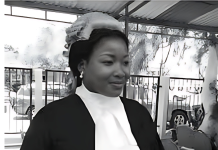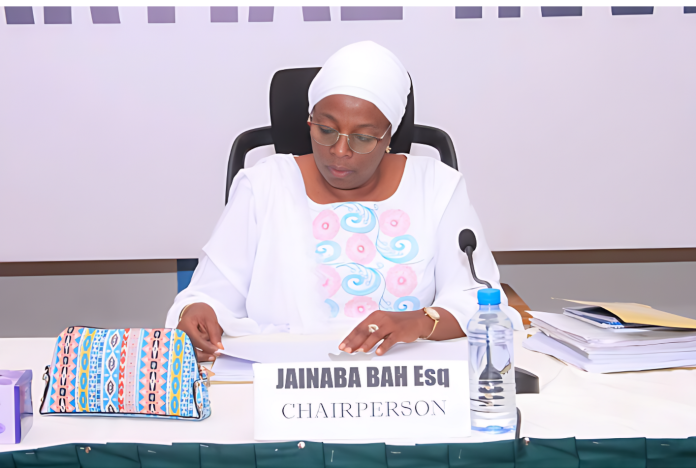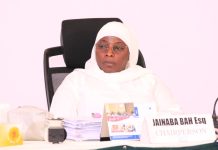By Yankuba Jallow
A former chairman of the Kerewan Area Council admitted on Tuesday, 22 July that he failed to act on a written warning from his council’s procurement officer, who had raised serious concerns about widespread irregularities, including the use of backdated invoices and exclusion from procurement processes.
Malamin I.N. Bojang, who served as chairman from May 2018 to May 2023, was testifying before the Local Government Commission of Inquiry — a national investigative body tasked with scrutinizing the financial and administrative operations of all local government councils between May 2018 and January 2023.
In measured but candid testimony, Bojang acknowledged receiving a letter dated 4 November 2021 from the council’s procurement officer, Fatoumata Jaiteh, who warned that she would no longer take part in the filing of backdated invoices from January 2022 onward, citing the practice as improper and non-compliant with procurement law. The letter was copied to the CEO, the chairman, and other senior council officials.
“Yes, I received the letter,” Bojang told the commission. “And I did call a meeting about it.”
But when asked what came out of the meeting, Bojang conceded that no minutes were taken, and that only three people — himself, the CEO, and another senior staff member — attended.
Lead counsel Patrick Gomez criticized the lack of documentation, saying, “This sounds more like a family meeting than a formal response to a whistleblower’s report of corruption.”
Gomez added that the letter should have triggered immediate oversight, especially from Bojang in his role as chairman. “She was telling you something serious,” he said. “She was telling you that there were corrupt practices happening.”
Bojang agreed. “I had an obligation to act,” he admitted.
A Council Without Controls
The testimony offered a striking portrait of a local council operating without basic administrative safeguards. According to Bojang, Kerewan Area Council had no Standing Orders to guide its operations, despite this being a legal requirement under the Local Government Act. He also admitted that for a long period, the council had no functional internal auditor, further weakening financial oversight.
He said the council had one female internal auditor when he assumed office in 2018, but she was later sent on a six-month capacity-building attachment at the Accountant General’s Department due to her limited qualifications. During her absence, Bojang said, the council continued making payments and carrying out expenditures without any internal auditing — both before and after spending.
Under Gambian law, internal auditors are required to review and approve all planned expenditures before payments are made and then conduct post-audits afterward. Bojang said these procedures were not followed during that period.
In fact, a 2018 audit report by the National Audit Office (NAO) stated that the internal auditor lacked the required qualifications. The council later wrote to the Ministry of Regional Government and Lands on 8 February 2021, asking the Ministry to facilitate the recruitment of a qualified auditor. However, Bojang said, there was no immediate appointment, and the internal auditor eventually returned.
Revenue Collection: Conflict of Roles
The inquiry also examined how the council assessed and collected revenue. Bojang told the commission that the former Chief Executive Officer, Samba Leigh, used to establish a team every year to conduct revenue assessments.
However, Gomez confronted him with evidence suggesting that the same individuals who assessed revenue were also responsible for collecting it — a practice ripe for abuse. Several revenue collectors had testified earlier that they performed both functions. Bojang responded that “sometimes it do happen,” but claimed his knowledge was limited to what the CEO reported to him.
“You were not involved?” Gomez asked.
“No, I wasn’t directly involved,” Bojang replied.
Ignoring Procurement Rules
Perhaps the most troubling part of Bojang’s testimony came as he responded to questions about procurement practices at the council. A compliance review by the Gambia Public Procurement Authority (GPPA) found that the council failed to follow due process in awarding contracts and procuring goods and services.
In 2022 alone, the council conducted 626 procurement transactions valued at D9,770,545.36. Of these, 615 were done through single-sourcing — a method that bypasses competitive bidding — and only 12 used the request-for-quotation procedure. Bojang admitted that there was no competition, no market survey, and no transparency.
“I relied on the procurement officer. She was very strict,” Bojang said.
But Gomez corrected him. “The procurement officer is not the boss. The director of finance and the CEO are her superiors,” he said, adding that the lack of open tendering pointed to systemic failure.
Bojang admitted that the contracts and finance committees were supposed to vet all procurement matters. He said meetings were held and minutes were taken but could not provide documentation proving that procurement decisions were formally approved by these committees.
When asked whether the council followed the required thresholds for expenditure approvals, Bojang said there was no enforcement of those thresholds. The law stipulates that the CEO can approve expenditures up to a certain limit, the chairman a higher amount, and that all spending above the chairman’s threshold must go to the full council for approval.
“That was not being done?” Gomez asked.
“No,” Bojang said plainly.
Whistleblower Sidelined
In perhaps the most damning portion of the hearing, Bojang admitted that the procurement officer, Jaiteh, had raised multiple red flags but her concerns were never meaningfully addressed.
In her letter, Jaiteh made it clear she would no longer participate in retroactively validating procurements in which she had no role. She further alleged that procurement decisions were being made by unauthorized staff, and that the procurement unit was often sidelined.
Despite this, Bojang said he only discussed the issue informally, and that no formal steps were taken against the CEO or any other staff.
“She was excluded from procurement processes and asked to fix the paperwork afterward,” Gomez said. “That’s not just improper. That’s evidence of a corrupt system.”
“She raised the concern, and I did not follow through properly,” Bojang conceded.
Gomez emphasized that while the procurement officer may not have had the power to enforce the law, Bojang, as chairman, did. “She was trying to do her job. You failed to do yours.”
The commission is expected to hear more from Bojang when his testimony resumes on Tuesday, 23 July 2025.






















